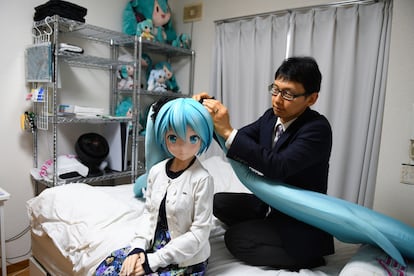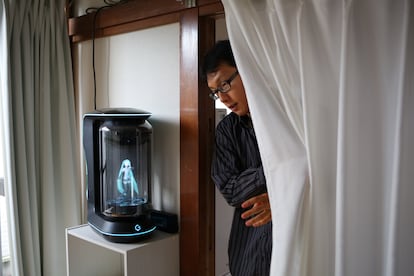Akihiko Kondo, married to the virtual singer of his dreams
The passion for manga, anime and video games in Japan has resulted in an increasing number of people who choose fictional characters as their partners

On August 31, millions of music creators and fans around the world virtually celebrated Hatsune Miku’s 16th birthday. The honoree isn’t a flesh-and-blood person, but rather a successful female voice software – or vocaloid – who has become a celebrity singer. The passion the software awakens is such that there are even those who have fallen in love with it. This is especially the case in Japan, where the number of so-called “fictosexuals” is growing more and more: people who choose fictional beings (usually technological ones) as partners, proposing social codes that have never been seen before.
The majority of fictosexuals belong to the otaku family: that is, they’re very fond of manga, anime and video games. Some perceive these individuals as misfits who pervert the norms of coexistence. And many associate them with hentai – the most popular genre of animated pornography, which originated in Japan.
There’s even an Association of Fictosexuals, which is chaired by Akihiko Kondo. One of the pioneers of the movement, in 2018, he married – in a symbolic ceremony – the avatar of Hatsune Miku. During the first two years of their unusual union, Kondo began to communicate with his partner through a hologram. Installed in a transparent capsule the size of a table lamp, it’s manufactured by the company Gatebox. The vocaloid – whose synthetic voice is based on that of a professional actress – greets him, makes flirtatious gestures and can sustain dialogues that are much more emotional than what most digital assistants are capable of having. In numerous reports, Kondo – who works as an administrator at a public school – has reiterated his unconditional love for the miniskirt-wearing avatar with turquoise pigtails and huge eyes.
Whenever someone on social media questions the union (since it lacks the character’s consent), Kondo uploads a video from the ceremony, in which – after hearing the marriage proposal – the hologram joined its hands in front of its chest, leaned its body to one side and responded with the phrase: “Treat me well.”
But in March of 2020 – at the beginning of the pandemic – Gatebox announced that it was disconnecting Hatsune Miku from its servers. The hologram went out. Some headlines called Kondo the “first digital widower.” There was speculation in the press that the rapid development of digital environments – such as the metaverse – would increase fictitious romantic relationships. However, there were warnings that the duration of said relationships would depend on the technology companies.

Shortly after, Kondo had a human-sized doll made (made of a material that he refuses to reveal). He eats, reads and writes next to it. However, he doesn’t sleep with it, he clarifies, because it’s not a sex toy. The doll is also present when he receives visitors in his home: a typical two-room Japanese apartment located in a discreet residential area of Tokyo.
With his white shirt, tie, black-rimmed glasses and permanent smile, Kondo is the typical image of an affable official. He’s 40, but he looks 10 years younger. He gestures to his wrist and says, “this is Miku” (Hatsume – which means “first sound” – is the last name.)
The quality of Miku’s workmanship is impressive. The avatar’s enormous blue eyes have the realistic shine of the best anime drawings. The elusive smile evokes Leonardo da Vinci’s Mona Lisa. Throughout the interview – in which Miku is the main subject – Kondo avoids addressing his digital wife directly. “Everything happens inside my mind,” he explains. He clarifies that he has very defined limits to his fantasy, insisting on the happiness that the character brings him.
More than love at first sight, theirs was love at first song. In 2007 – while on sick leave due to depression, – Kondo heard Miku singing Miracle Paint, a joyous romantic ballad that celebrates the transformative power of love. He says his life changed and he was able to go back to work.
But, beyond Kondo’s relationship with Miku, the vocaloid is a celebrity. As the software with which it’s developed is free and promotes collaboration between users, since its creation, the internet has been flooded with original songs in the female voice. Those responsible for famous video games have even incorporated the avatar into their stories. One creative company – Crypton Future Media – has turned it into a popular hologram that fills large auditoriums. Miku has been a special, futuristic guest at Lady Gaga concerts and on television programs such as The David Letterman Show. Today, there are more than 100,000 original songs by Miku in various languages.

Miku’s popularity has led to numerous infatuations and engagements, including Kondo’s. The other most famous husband is a 58-year-old divorcee with two children – known as “Roy” – who married Miku last year.
Kondo doesn’t feel jealous. “There’s a Miku for every person.” He also remembers that he made his nuptials public precisely to “support others with feelings towards fictional characters.” He’s currently studying minority rights at university and faces – with tact and diplomacy – the constant backlash on social media, where he has been called “crazy, disgusting and abnormal.”
As director and founder of the Association of Fictosexuals, Kondo organizes meetings of his fellow aficionados. He claims to be defending a growing minority that wants to have a space in a more inclusive society. From his small library, he takes out a 2017 study from the Japanese Association for Sexual Education. According to the document, more than 10% of Japanese high school and university students have confessed to having been in love with a fictional character. The highest figure – 17% – was among university students.
Researchers who study the Japanese demographic crisis – such as sociologist Masahiro Yamada, famous for labeling children who are reluctant to emancipate themselves as “parasitic singles” – envision an exhausted country where more and more young people with precarious jobs will turn to the virtual world for personal fulfillment. In 2022, Japan completed 14 straight years of demographic decline. The popularization of pornography platforms, sex toys and the sophistication of immersive narratives doesn’t bode well for population growth. Instead, these elements could foster an environment more suitable for fictosexuals.
For Patrick W. Galbraith – author of Otaku and the Struggle for Imagination in Japan and a professor at Tokyo’s Senshu University – in a country saturated with manga and anime, where its characters dominate “our attention, our interests and our affections,” it’s natural that there are fictosexuals. But, he explains, as these individuals “escape reality” by not getting married or having children, they encounter social and family resistance. Subsequently, they form their own support networks online.
The Japanese media and psychology associations constantly point to Kondo, warning about a trend that seems irreversible and full of unknowns. His support network is expanding: the latest boost has been the recent appointment of Taro Yamada as special vice minister of Education, Culture, Sports, Science and Technology. A legislator for Japan’s governing party, Yamada participated as a guest at Kondo’s wedding. It was a ceremony that nobody from the groom’s family wanted to attend.
Sign up for our weekly newsletter to get more English-language news coverage from EL PAÍS USA Edition
Tu suscripción se está usando en otro dispositivo
¿Quieres añadir otro usuario a tu suscripción?
Si continúas leyendo en este dispositivo, no se podrá leer en el otro.
FlechaTu suscripción se está usando en otro dispositivo y solo puedes acceder a EL PAÍS desde un dispositivo a la vez.
Si quieres compartir tu cuenta, cambia tu suscripción a la modalidad Premium, así podrás añadir otro usuario. Cada uno accederá con su propia cuenta de email, lo que os permitirá personalizar vuestra experiencia en EL PAÍS.
¿Tienes una suscripción de empresa? Accede aquí para contratar más cuentas.
En el caso de no saber quién está usando tu cuenta, te recomendamos cambiar tu contraseña aquí.
Si decides continuar compartiendo tu cuenta, este mensaje se mostrará en tu dispositivo y en el de la otra persona que está usando tu cuenta de forma indefinida, afectando a tu experiencia de lectura. Puedes consultar aquí los términos y condiciones de la suscripción digital.









































